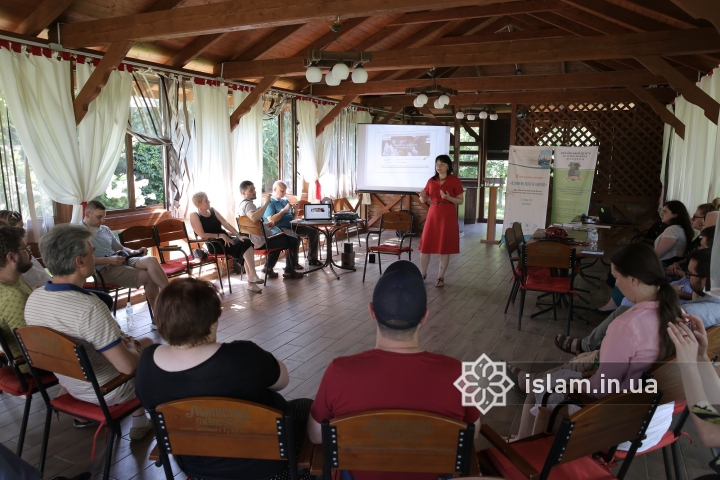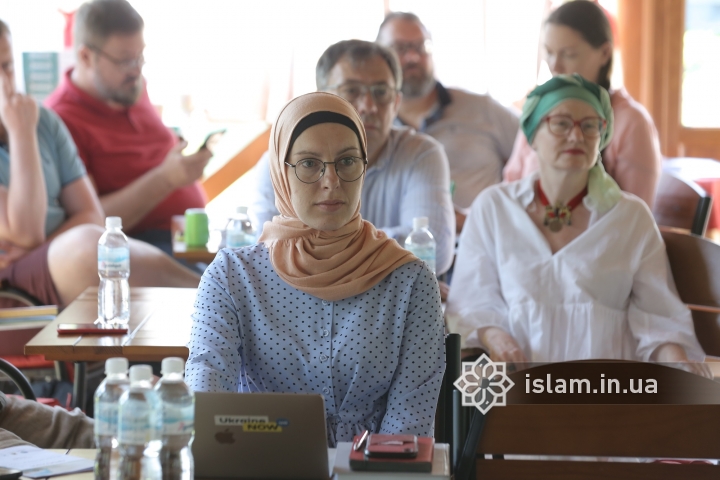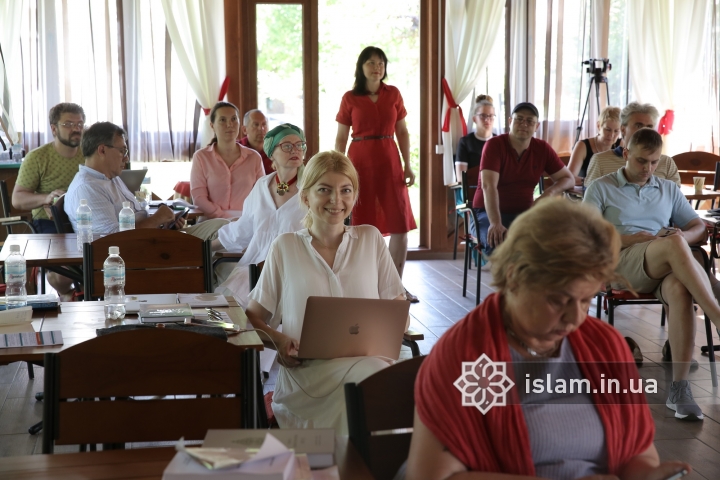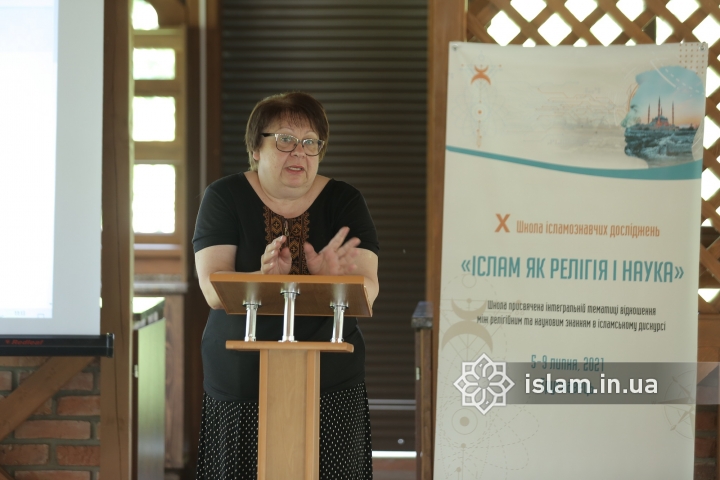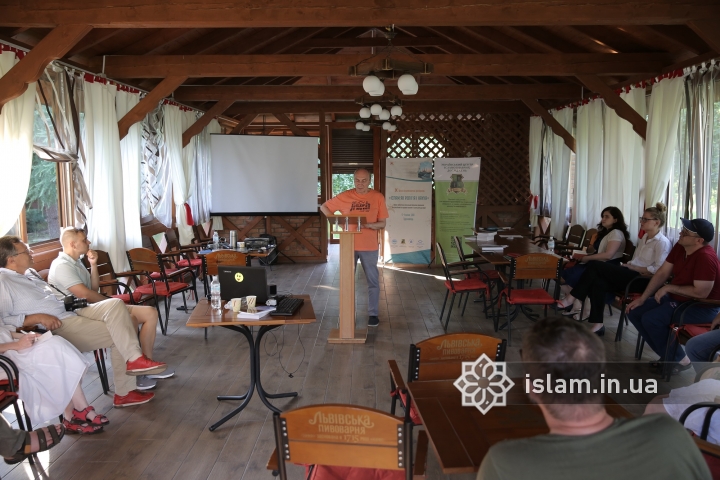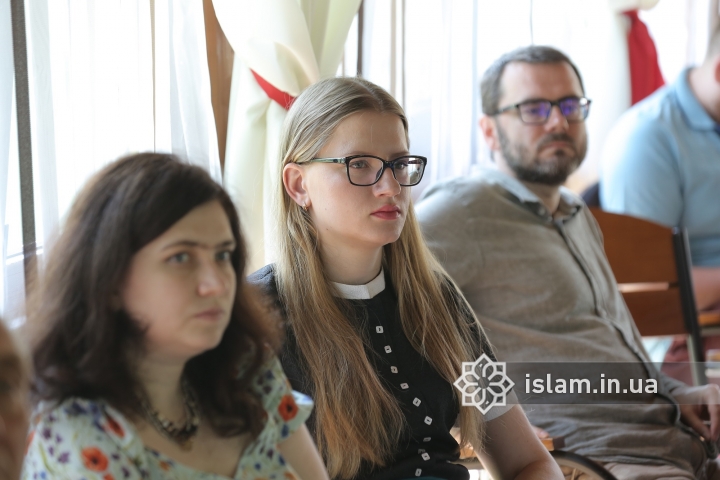On July 5, in Truskavets, the X-anniversary School of Islamic Studies began its work, the theme of which this year is "Islam as a religion and science." The event was organized by the Public Union "Alraid All-Ukrainian Association", the Ukrainian Center for Islamic Studies, the International Institute of Islamic Thought and the Institute of Knowledge Integration. All conditions were created for several dozens of scientists from Ukraine and other countries to have the opportunity to exchange views during five days, share research results, and discuss joint projects.
Sheikh Said Ismagilov, the head of the Ukrainian Center for Islamic Studies and Ph.D., opened the school with a traditional Muslim greeting with wishes for peace. He reminded the participants of its history by telling them about the groundwork and achievements of its students and lecturers, and gave the floor to the Chairman of the All-Ukrainian Association "Alraid", member of the Ukrainian Center for Fatwas and Research, Master of Sharia Sciences Seyran Aryfov. Sheikh Seyran became one of the speakers of the first section called Islam and Global Processes.
On the first day, the participants listened to several lectures. Thus, Roman Nazarenko, a doctoral student at Tilburg University (Netherlands) and a lecturer at the Ukrainian Catholic University (UCU), made a presentation titled Orientalism, stereotypes and Disney: applied stories about Aladdin and presented his book Unexpected Islam.
Natalya Malinovskaya, a Candidate of Political Sciences (National University "Ostroh Academy") gave a lecture titled The nature of Islamic feminism among the ancestors of the "western" and "eastern" scientists. Also, she presented her book Woman's Emirate? Politicians of the Muslim world.
The report of Grigory Mavrov, a Master of Islamic Studies at the Hamad bin Khalifa University (Qatar) was titled Debates on Yoga among modern Islamic scholars, and Seyran Aryfov presented his book called Sharia and Politics.
In the evening lecture hall, a Candidate of Historical Sciences, an Associate Professor at H.Skovoroda Institute of Philosophy of the NAS of Ukraine Igor Kozlovsky began a series of conversations called Medicine of the Prophet Muhammad.
Some school participants shared their impressions and thoughts about its relevance.
Lyudmila Filipovich, a Doctor of Philosophy and Professor, the Head of the Department of Philosophy and History of Religion at the H. Skovoroda Institute of Philosophy of the National Academy of Sciences of Ukraine:
- This is already the tenth school, that is, it has already become a tradition to gather leading scientists of Ukraine around Islamic studies, inviting representatives of other traditions from other countries. This tenth school is attended by Turkish and American participants, and scientists from Azerbaijan and Poland ... And the main point is that this scientific community is becoming more and more powerful from year to year, new scientists are appearing and becoming candidates and doctors of sciences. And the theme of the school, namely Islamic studies, is becoming interesting to the Ukrainian society, because Muslims have long been a part of the religious landscape of our country, and today it is impossible to imagine a religious Ukraine without them. And this is not only because [after the occupation] Muslims from Crimea and the occupied territories of Donetsk and Luhansk regions arrived, and we know this is more than 50 thousand people, but also because Islam has always accompanied Ukrainian history. And for a long time, it has been "forgotten" about and blurred, hasn't been remembered about, and hasn't been talked about the proximity of the same Crimean Tatar and Ukrainian peoples, about the closeness of Islam and Christianity, that is, this should not have worked in this imperial concept of the "Russian peace", where different has always been seen as an enemy, and this has divided our society. I think completely different times have come and, on the contrary, one should look for something that brings together different traditions and different peoples, languages and cultures. And the school is an absolutely perfect example of how people of different nationalities and religious views can unite within the same topic. I believe this school has a future, and I am glad that young people participate in it. You know, today with such an “ancient aksakal” of religious studies, which is actually Anatoly Kolodny at his 84, and we are with Kozlovsky, - laughs Lyudmila Filipovich, - there are young researchers nearby at the school. And it is very pleasant that scientists join and take interest. This means that this science has a future. And I really want more and more people to destroy those stereotypes about Muslims that have been imposed on us for so many years so that we understand we live in the multi-religious state of Ukraine, and there should be no enemies here. Here we must all unite to build a normal, democratic, free, self-sufficient country.
Ruslan Khalikov, a religious scholar:
- The tenth school is special, first of all, because it is an anniversary one. This means that for ten years now there has been a tendency to research and popularize Islamic studies and, thus, this is no longer just a single initiative, but a steady trend. And it is very good that there is such an open, public, powerful team ready to conduct these schools. And we see that there are more and more achievements among the participants, not just only among the lecturers. People publish articles, books, and two Islamic studies magazines have already appeared during the school. The first magazine called Al-Qalam is actually the first Ukrainian academic publication on Islamic studies. The second journal was created not within the framework of this school, but in Ostroh, as a separate Islamic studies publication, claiming to be scientometric and meeting the requirements of the Ministry of Education, etc. In other words, it is a scientific journal, but its editors and authors are the participants in these summer schools in different years. And it is important to support the school as a platform for the growth of Islamic studies.
Professor of the University of the State Fiscal Service of Ukraine Gennadiy Khristokin, a religious scholar, Doctor of Philosophy, takes part in the School of Islamic Studies for the second time:
- This school is interesting for me because its main topic is related to the interaction of religion and science so this is a very interesting and relevant issue. Today it is especially relevant for Islam, many modern Muslim theologians raise it, revealing such a trend, such a methodology, such an approach [showing] the possibility of interaction between science and religion <...>. My position, which I will report here about, is that such a dialogue is possible on the basis of philosophical methodologies. That is, it is necessary to involve philosophical methodologies for theology. All the school participants, in my opinion, represent such a position, sufficiently balanced methodologically, which shows that Islamic studies is a modern scientific trend. It is integrated into both religious studies and Muslim theology, and these two branches of research, academic religious studies and Islamic studies, on the one hand, and theological Islamic studies cooperate very closely in dialogue, in the publication of journals, articles, monographs. There is no particular conflict here. That is why it is so important and relevant.
Vadym Slyusar, a Doctor of Philosophy, Zhytomyr Ivan Franko State University:
- First of all, why such schools are needed. Last year we were forced to conduct the IX school online, and there were many participants, which shows that communication is important for people. Today there is a lot of research on Islamic studies. We especially take into account that Ukraine is on the line of three civilizations, one of which is Islamic. A powerful interaction is taking place, both culturally and politically. It is extremely important to rethink the role and place of Islam in Ukrainian society and history. We should get rid of many stereotypes, especially when we talk about the politicization of history and the presentation of it as an eternal enmity between Ukrainians and other neighbors, forgetting about those moments of military interaction, both political and cultural. It is also important that the school, in fact, operates all year round, because after we finish it, we always communicate and share some information. Someone does an interesting research; joint articles are published. For example, together with Mariusz Marszewski (Ph.D., Poland - Ed.), I published an article on PR activities of religious organizations, and I think that we will continue our research in this direction. School participants help each other. First, they create some new projects within the school, in accreditations, in conducting lectures of the invited professors. So, we, at ZSU, had an interesting scientific seminar called Religious journalism, featuring the professor of the Kyiv National University Alla Boyko. And now we see that they are opening a master's program in this area. Our Master's degree also has a certain focus on the study of religion. We exchange some projects and experience in holding events, so I think this school is very important. One of the school participants, Mykhaylo Yakubovych, is the editor-in-chief of the journal Visnyk ZSU on Philosophical Sciences, that is, interaction takes place not only during school. School is just a presentation of achievements, of what has been achieved during the year.

